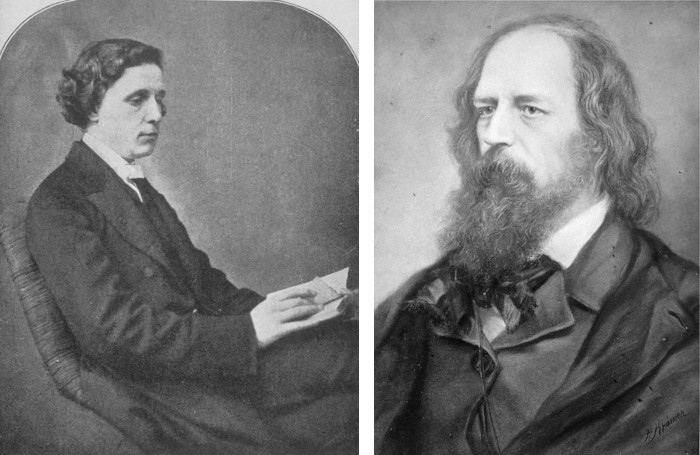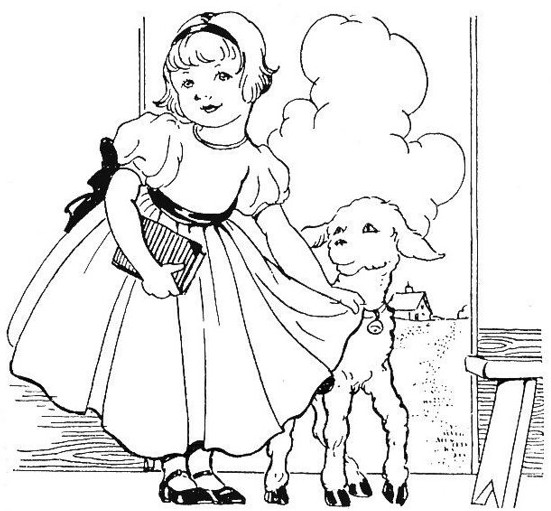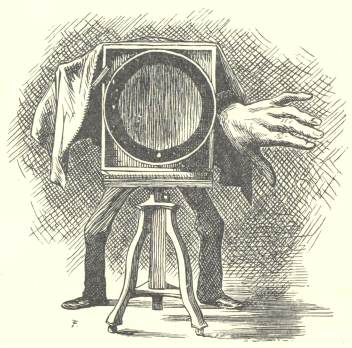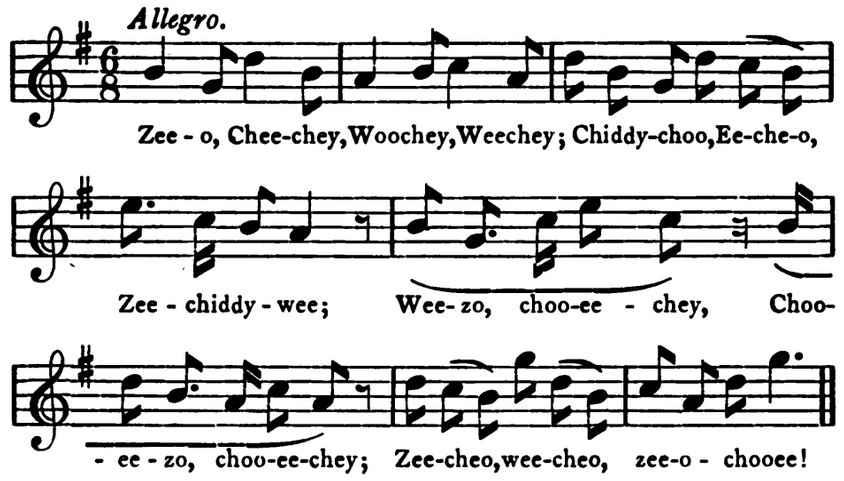Can omniscient God, who
Knows the future, find
The omnipotence to
Change His future mind?
— Karen Owens
Can omniscient God, who
Knows the future, find
The omnipotence to
Change His future mind?
— Karen Owens
The wind was rough
And cold and blough,
She kept her hands within her mough.
It chill’d her through,
Her nose grough blough
And still the squall the faster flough.
And yet although
There was nough snough,
The weather was a cruel fough.
It made her cough —
Pray do not scough! —
She coughed until her hat blew ough.
Ah, you may laugh,
You silly caugh!
I’d like to beat you with my staugh.
Her hat she caught,
And saught and faught
To put it on and tie it taught.
Try as she might
To fix it tight
Again it flew off like a kight,
Away up high
Into the skigh.
The poor girl sat her down to crigh.
She cried till eight
P.M., so leight!
Then home she went at a greight reight.
— J.H. Walton
In a certain fair island, for commerce renown’d,
Whose fleets sailed in every sea,
A set of fanatics, men say, there was found,
Who set up an island and worship around,
And called it by name Elessdé.
Many heads had the monster, and tails not a few,
Of divers rare metals was he;
And temples they built him right goodly to view,
Where oft they would meet, and, like idolists true,
Pay their vows to the great Elessdé.
Moreover, at times would their frenzy attain
(‘Twas nought less) to so high a degree,
That his soul-blinded votaries did not complain,
But e’en laid down their lives his false favour to gain–
So great was thy power, Elessdé.
As for morals, this somewhat unscrupulous race
Were lax enough, ‘twixt you and me;
Men would poison their friends with professional grace,
And of the fell deed leave behind ne’er a trace,
For the sake of the fiend, Elessdé.
Then forgery flourished, and rampant and rife
Was each form of diablerie;
While the midnight assassin, with mallet and knife,
Would steal on his victim and rob him of life,
And all for thy love, Elessdé.
There were giants of crime on the earth in that day,
The like of which we may not see:
Although, peradventure, some sceptic will say
There be those even now who acknowledge the sway
Of the god of the world — £ s. d.
(That is, pounds, shillings, and pence, the pre-decimal currencies of the British Isles.)
From William T. Dobson, Poetical Ingenuities and Eccentricities, 1882.

Lewis Carroll and Alfred, Lord Tennyson, became improbable acquaintances in the 1850s, a few years before Carroll published Alice’s Adventures in Wonderland. The young author sent a letter to his cousin, May 11, 1859, after one memorable visit to the laureate:
Tennyson told us that often on going to bed after being engaged on composition he had dreamed long passages of poetry (‘You, I suppose,’ turning to me, ‘dream photographs?’) which he liked very much at the time, but forgot entirely when he woke. One was an enormously long one on fairies, where the lines from being very long at first gradually got shorter and shorter, till it ended with fifty or sixty lines of two syllables each! The only bit he ever remembered enough to write down was one he dreamed at ten years old, which you may like to possess as a genuine unpublished fragment of the Laureate, though I think you will agree with me that it gives very little indication of his future poetic powers:—
May a cock-sparrow
Write to a barrow?
I hope you’ll excuse
My infantine muse.
(Lewis Carroll, “A Visit to Tennyson,” Strand, June 1901. See Pillow Verse and Night Work.)

The wordplay journal Word Ways has made a tradition of revising the familiar rhyme “Mary Had a Little Lamb” under various constraints. Some examples:
Alliteration: James Puder, WW February 1998
Astral Aries’ avatar, alabaster “Aly,”
Ann adopted; allies are Ann and Ann’s argali.
Ann, an able autodidact, academic angst avoids;
And arch Aly’s Argus-eyed act awes astonished anthropoids.
Pangram (uses all 26 letters): A. Ross Eckler, WW February 1989
Mary had a little lamb with fleece extremely white;
Instead of grazing, all alone, the lamb kept her in sight.
It followed her to school one day, which was against the rule;
The children thought it quite a joke to view a lamb in school.
Words formed of chemical element symbols: WW February 2008
ONe TiNY AgNUS SHe NoW OWNS (SNOW-WHITe IS HEr CoAt),
WHeN HEr LaDy IS NeArBY, AgNUS STaYS, I NoTe.
In ClAsS ONe MoRn SHe TaKEs HEr PLaCe; TeAcHEr CrIEs “SHoO! RUN!”
HeAr THoSe LaSSiEs ScReAm “HoW CuTe!” ThIS AgNUS — PURe FUN!”
Four-letter words: Dave Morice, WW November 2006
Mary kept some tiny lamb with wool hued just like snow,
Each spot that this girl, Mary, went, that lamb went also (slow).
Once lamb went past home room with girl. That bent some rule last year.
This made kids loud, glad, made them play: they eyed lamb very near.
Three-letter and shorter words: Jeff Grant, WW May 2004
Amy had an ewe so wee, it was an icy hue,
And any way our Amy led, the ewe it did go too.
It ran in to her den one day (an act not in the law).
Oh, the fun for boy and gal! The ewe so wee all saw.
Another poem by James Clerk Maxwell:
The tendrils of my soul are twined
With thine, though many a mile apart.
And thine in close coiled circuits wind
Around the needle of my heart.
Constant as Daniel, strong as Grove.
Ebullient throughout its depths like Smee,
My heart puts forth its tide of love,
And all its circuits close in thee.
O tell me, when along the line
From my full heart the message flows,
What currents are induced in thine?
One click from thee will end my woes.
Through many a volt the weber flew,
And clicked this answer back to me;
I am thy farad staunch and true,
Charged to a volt with love for thee.

Lewis Carroll was an early enthusiast of photography, though he seems to have found the social aspects trying — he published this poem in 1857:
From his shoulder Hiawatha
Took the camera of rosewood,
Made of sliding, folding rosewood;
Neatly put it all together.
In its case it lay compactly,
Folded into nearly nothing;
But he opened out the hinges,
Pushed and pulled the joints and hinges,
Till it looked all squares and oblongs,
Like a complicated figure
In the Second Book of Euclid.
This he perched upon a tripod —
Crouched beneath its dusky cover —
Stretched his hand, enforcing silence —
Said, “Be motionless, I beg you!”
Mystic, awful was the process.
All the family in order
Sat before him for their pictures:
Each in turn, as he was taken,
Volunteered his own suggestions,
His ingenious suggestions.
First the Governor, the Father:
He suggested velvet curtains
Looped about a massy pillar;
And the corner of a table,
Of a rosewood dining-table.
He would hold a scroll of something,
Hold it firmly in his left-hand;
He would keep his right-hand buried
(Like Napoleon) in his waistcoat;
He would contemplate the distance
With a look of pensive meaning,
As of ducks that die ill tempests.
Grand, heroic was the notion:
Yet the picture failed entirely:
Failed, because he moved a little,
Moved, because he couldn’t help it.
Next, his better half took courage;
She would have her picture taken.
She came dressed beyond description,
Dressed in jewels and in satin
Far too gorgeous for an empress.
Gracefully she sat down sideways,
With a simper scarcely human,
Holding in her hand a bouquet
Rather larger than a cabbage.
All the while that she was sitting,
Still the lady chattered, chattered,
Like a monkey in the forest.
“Am I sitting still?” she asked him.
“Is my face enough in profile?
Shall I hold the bouquet higher?
Will it came into the picture?”
And the picture failed completely.
Next the Son, the Stunning-Cantab:
He suggested curves of beauty,
Curves pervading all his figure,
Which the eye might follow onward,
Till they centered in the breast-pin,
Centered in the golden breast-pin.
He had learnt it all from Ruskin
(Author of ‘The Stones of Venice,’
‘Seven Lamps of Architecture,’
‘Modern Painters,’ and some others);
And perhaps he had not fully
Understood his author’s meaning;
But, whatever was the reason,
All was fruitless, as the picture
Ended in an utter failure.
Next to him the eldest daughter:
She suggested very little,
Only asked if he would take her
With her look of ‘passive beauty.’
Her idea of passive beauty
Was a squinting of the left-eye,
Was a drooping of the right-eye,
Was a smile that went up sideways
To the corner of the nostrils.
Hiawatha, when she asked him,
Took no notice of the question,
Looked as if he hadn’t heard it;
But, when pointedly appealed to,
Smiled in his peculiar manner,
Coughed and said it ‘didn’t matter,’
Bit his lip and changed the subject.
Nor in this was he mistaken,
As the picture failed completely.
So in turn the other sisters.
Last, the youngest son was taken:
Very rough and thick his hair was,
Very round and red his face was,
Very dusty was his jacket,
Very fidgety his manner.
And his overbearing sisters
Called him names he disapproved of:
Called him Johnny, ‘Daddy’s Darling,’
Called him Jacky, ‘Scrubby School-boy.’
And, so awful was the picture,
In comparison the others
Seemed, to one’s bewildered fancy,
To have partially succeeded.
Finally my Hiawatha
Tumbled all the tribe together,
(‘Grouped’ is not the right expression),
And, as happy chance would have it
Did at last obtain a picture
Where the faces all succeeded:
Each came out a perfect likeness.
Then they joined and all abused it,
Unrestrainedly abused it,
As the worst and ugliest picture
They could possibly have dreamed of.
‘Giving one such strange expressions —
Sullen, stupid, pert expressions.
Really any one would take us
(Any one that did not know us)
For the most unpleasant people!’
(Hiawatha seemed to think so,
Seemed to think it not unlikely.)
All together rang their voices,
Angry, loud, discordant voices,
As of dogs that howl in concert,
As of cats that wail in chorus.
But my Hiawatha’s patience,
His politeness and his patience,
Unaccountably had vanished,
And he left that happy party.
Neither did he leave them slowly,
With the calm deliberation,
The intense deliberation
Of a photographic artist:
But he left them in a hurry,
Left them in a mighty hurry,
Stating that he would not stand it,
Stating in emphatic language
What he’d be before he’d stand it.
Hurriedly he packed his boxes:
Hurriedly the porter trundled
On a barrow all his boxes:
Hurriedly he took his ticket:
Hurriedly the train received him:
Thus departed Hiawatha.
He introduced it by writing, “In an age of imitation, I can claim no special merit for this slight attempt at doing what is known to be so easy. Any fairly practised writer, with the slightest ear for rhythm, could compose, for hours together, in the easy running metre of The Song of Hiawatha. Having then distinctly stated that I challenge no attention in the following little poem to its merely verbal jingle, I must beg the candid reader to confine his criticism to its treatment of the subject.”
“The Mathematician in Love,” by Scottish mechanical engineer William Rankine (1820-1872):
A mathematician fell madly in love
With a lady, young, handsome, and charming:
By angles and ratios harmonic he strove
Her curves and proportions all faultless to prove
As he scrawled hieroglyphics alarming.
He measured with care, from the ends of a base,
The arcs which her features subtended:
Then he framed transcendental equations, to trace
The flowing outlines of her figure and face,
And thought the result very splendid.
He studied (since music has charms for the fair)
The theory of fiddles and whistles,–
Then composed, by acoustic equations, an air,
Which, when ’twas performed, made the lady’s long hair
Stand on end, like a porcupine’s bristles.
The lady loved dancing:–he therefore applied,
To the polka and waltz, an equation;
But when to rotate on his axis he tried,
His centre of gravity swayed to one side,
And he fell, by the earth’s gravitation.
No doubts of the fate of his suit made him pause,
For he proved, to his own satisfaction,
That the fair one returned his affection;–“because,
“As every one knows, by mechanical laws,
“Re-action is equal to action.”
“Let x denote beauty,–y, manners well-bred,–
“z, Fortune,–(this last is essential),–
“Let L stand for love”–our philosopher said,–
“Then L is a function of x, y, and z,
“Of the kind which is known as potential.”
“Now integrate L with respect to d t,
“(t standing for time and persuasion);
“Then, between proper limits, ’tis easy to see,
“The definite integral Marriage must be:–
“(A very concise demonstration).”
Said he–“If the wandering course of the moon
“By Algebra can be predicted,
“The female affections must yield to it soon”–
–But the lady ran off with a dashing dragoon,
And left him amazed and afflicted.
Rhymes for unrhymable words, by Willard R. Espy:
It is unth-
inkable to find
A rhyme for month
Except this special kind.
The four eng-
ineers
Wore orange
Brassieres.
Love’s lost its glow?
No need to lie; j-
ust tell me “go!”
And I’ll oblige.
(From his entertaining rhyming dictionary.)

In his 1922 book Songs of the Birds, Oxford zoologist Walter Garstang set out to record birdsongs as musical compositions:
The peculiar quality or timbre of each bird’s voice and the resonance of each sound have been imitated as closely as possible by a selection of human consonants; the composition of the song has been represented by the appropriate repetition, modification, or contrast of selected syllables; the syllabic rendering has been cast in a corresponding rhythm; and round this chosen sequence of syllables a song has been woven to capture something, if possible, of the joy or of the attendant circumstances which form the natural setting of his song.
“I fell in love with my models,” he wrote, “and could not content myself with a purely scientific account of their performances.” He was similarly enraptured by amphibians — the 1951 book Larval Forms collects his poems about marine larvae:
Amblystoma’s a giant newt who rears in swampy waters,
As other newts are wont to do, a lot of fishy daughters:
These Axolotls, having gills, pursue a life aquatic,
But, when they should transform to newts, are naughty and erratic.
His colleague Alister Hardy wrote, “I certainly believe that he gets his ideas across with much greater felicity in these sparkling rhymes than he has done in all his more carefully calculated prose.”
See Bird Songs.